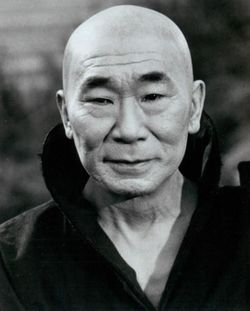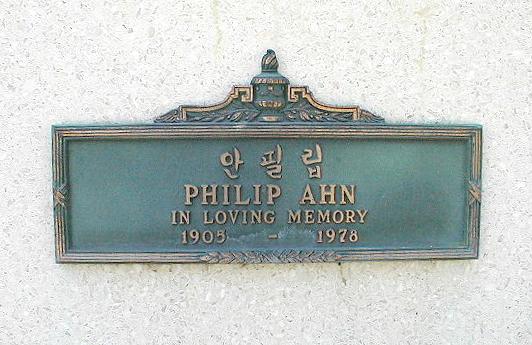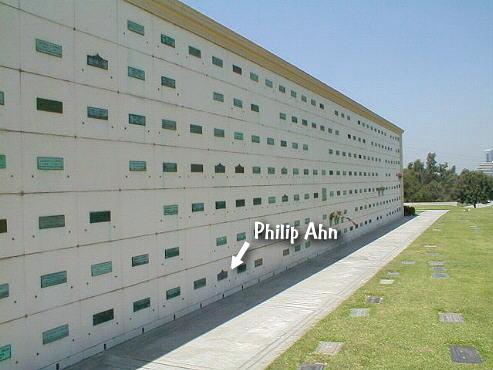Actor. Born Pil Lip Ahn in Highland Park, California, the eldest child of Dosan Ahn Chang Ho and his wife, Helen Lee, who were the first immigrant Korean married couple admitted into the United States, arriving in 1902. He attended Polytechnic High School where he took drama and speech classes and was a member of the Mask and Sandal Drama Club. While still in school, he was given a screen test by Douglas Fairbanks, but his parents required that he finish his studies. After his graduation, he worked as a rice field laborer, truck driver, and elevator operator to support his family before he enrolled at University of South California in 1934, where he majored in foreign commerce and speech. He abandoned his studies after his sophomore year to make his screen debut in 1935's "A Scream in the Night." There followed over two years of largely uncredited appearances in almost a dozen films including 1937's "The Good Earth." His father, a Korean independence activist, died in Japanese hands in 1938. Throughout the 1930s and 1940s Ahn became a well-known face, usually playing either Chinese or Japanese characters in such films as "King of Chinatown" in 1939; "China Girl" in 1942; "They Got Me Covered" in 1943; and "Back to Bataan" in 1945. He joined the US Army that same year in order to counter his wartime film image of the enemy. His image lightened throughout the 1950s, 1960s, and 1970s, even appearing in the 1967 musical comedy "Thoroughly Modern Millie." He also began taking television roles appearing in such television series as "The Man From UNCLE," "I Spy," "Mission Impossible," "Kung Fu," and "MASH." In November of 1973 he obtained permission to open and dedicate Dosan Ahn Chang Ho Park in Seoul, Korea where his father had been buried by the Japanese some 35 years before. He brought his mother's remains from Los Angeles to be buried next to his father's. His last television appearance was in a 1978 episode of "Police Woman." He succumbed to complications from a lung biopsy which led to pneumonia. November 14th was declared Philip Ahn Day and Korea Day for the City of Los Angeles. He has a star on the Walk of Fame at 6211 Hollywood Boulevard near Argyle Avenue.
Actor. Born Pil Lip Ahn in Highland Park, California, the eldest child of Dosan Ahn Chang Ho and his wife, Helen Lee, who were the first immigrant Korean married couple admitted into the United States, arriving in 1902. He attended Polytechnic High School where he took drama and speech classes and was a member of the Mask and Sandal Drama Club. While still in school, he was given a screen test by Douglas Fairbanks, but his parents required that he finish his studies. After his graduation, he worked as a rice field laborer, truck driver, and elevator operator to support his family before he enrolled at University of South California in 1934, where he majored in foreign commerce and speech. He abandoned his studies after his sophomore year to make his screen debut in 1935's "A Scream in the Night." There followed over two years of largely uncredited appearances in almost a dozen films including 1937's "The Good Earth." His father, a Korean independence activist, died in Japanese hands in 1938. Throughout the 1930s and 1940s Ahn became a well-known face, usually playing either Chinese or Japanese characters in such films as "King of Chinatown" in 1939; "China Girl" in 1942; "They Got Me Covered" in 1943; and "Back to Bataan" in 1945. He joined the US Army that same year in order to counter his wartime film image of the enemy. His image lightened throughout the 1950s, 1960s, and 1970s, even appearing in the 1967 musical comedy "Thoroughly Modern Millie." He also began taking television roles appearing in such television series as "The Man From UNCLE," "I Spy," "Mission Impossible," "Kung Fu," and "MASH." In November of 1973 he obtained permission to open and dedicate Dosan Ahn Chang Ho Park in Seoul, Korea where his father had been buried by the Japanese some 35 years before. He brought his mother's remains from Los Angeles to be buried next to his father's. His last television appearance was in a 1978 episode of "Police Woman." He succumbed to complications from a lung biopsy which led to pneumonia. November 14th was declared Philip Ahn Day and Korea Day for the City of Los Angeles. He has a star on the Walk of Fame at 6211 Hollywood Boulevard near Argyle Avenue.
Bio by: Iola
Inscription
Philip Ahn
In Loving Memory
1905-1978
Family Members
Advertisement
See more Ahn memorials in:
Records on Ancestry
Advertisement










